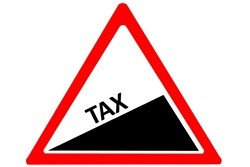
Top stories






More news


Marketing & Media
Ads are coming to AI. Does that really have to be such a bad thing?














The submission follows a request by the minister that the committee - which has been tasked with a comprehensive review of South Africa's tax laws - find ways to finance the government's funding shortfall.
The committee has already submitted reports on the tax regime for small business‚ on the base erosion‚ and on profit shifting practised by multinationals.
The committee's tax-raising proposals are likely to be considered by the Treasury as it prepares the 2015-16 national budget, which is expected to include tax increases.
In his speech on the medium-term budget policy statement (MTBPS) tabled in parliament in October, Nene said that if government was to avoid reducing expenditure in real terms‚ about R15bn a year in additional revenue would have to be raised.
"The revenue measures will be designed to limit as far as possible any negative impact on growth and job creation. Acting now to re-establish a sustainable foundation for public finances will enable the government to rebuild fiscal space in the years ahead‚" Nene said at the time.
The MTBPS said the government was looking to raise an additional R44bn in taxes over the next three years.
Tax experts believe the tax rises will be directed at wealth taxes such as estate duty and capital gains tax and possibly higher ad valorem taxes on imported luxury goods.
They also point out‚ however‚ that high income earners are already heavily taxed in South Africa and that taxing them more would not yield much in additional revenue.
Several tax practitioners, however, argue that a hike in the VAT rate from its current 14% is the only way to raise a substantial amount. A one-percentage point increase would bring in an additional R20bn in revenue.
The squeeze on government finances has tightened as economic growth has slowed and as the demand for state assistance by state-owned companies - particularly Eskom - has intensified.
Growth of only 1.4% is expected this year compared with the 2.7% forecast in the February budget, though the budget deficit of 4.1% is in line with the original estimate.
Tax revenue was revised down by R10bn from R993.7bn in the February budget to R983.6bn due to the sharp decline in economic growth.
Also to be announced in the February budget will be the non-strategic assets which will be sold to raise what Nene said would be R20bn or more.

For more than two decades, I-Net Bridge has been one of South Africa’s preferred electronic providers of innovative solutions, data of the highest calibre, reliable platforms and excellent supporting systems. Our products include workstations, web applications and data feeds packaged with in-depth news and powerful analytical tools empowering clients to make meaningful decisions.
We pride ourselves on our wide variety of in-house skills, encompassing multiple platforms and applications. These skills enable us to not only function as a first class facility, but also design, implement and support all our client needs at a level that confirms I-Net Bridge a leader in its field.
Go to: http://www.inet.co.za